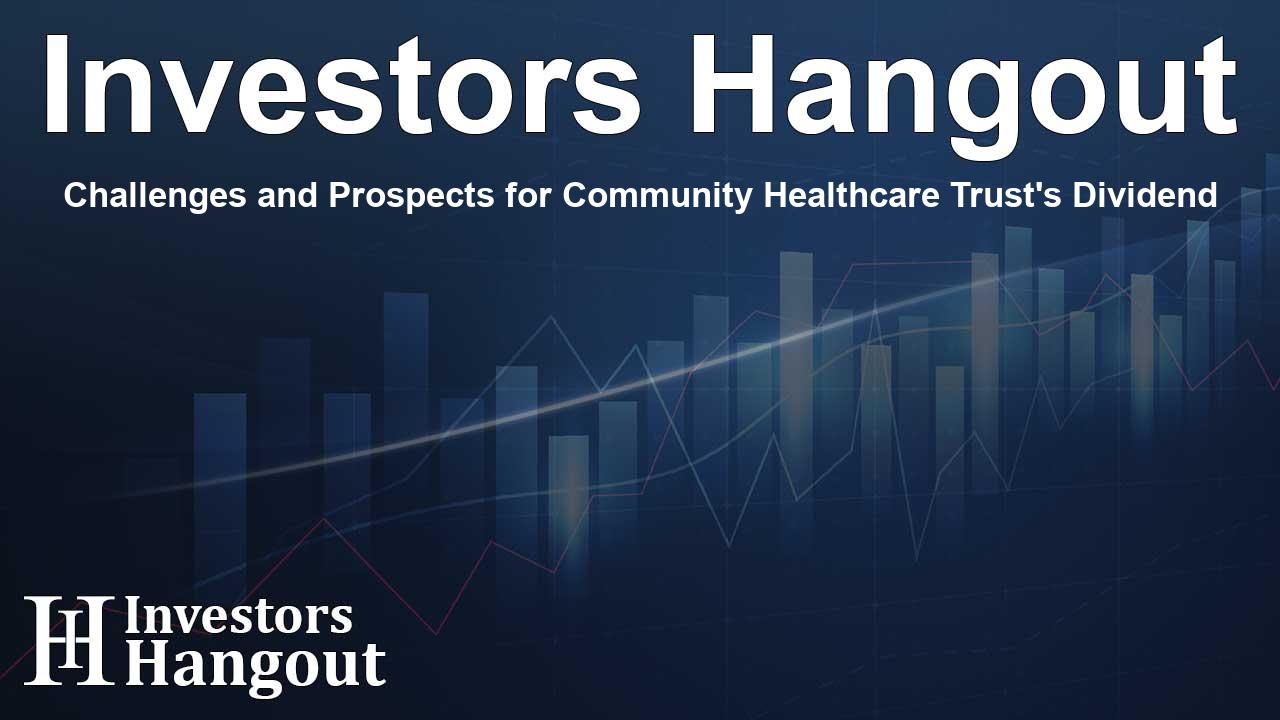Challenges and Prospects for Community Healthcare Trust's Dividend

Understanding Community Healthcare Trust's Current Dividend Yield
Community Healthcare Trust (NYSE: CHCT) has become an intriguing option for dividend-seeking investors due to its impressive yield, which currently exceeds 10%. This is a significant markup compared to the S&P 500’s yield of less than 1.5%. Such a robust dividend is remarkable, especially considering the company’s history of consistently increasing its payouts since going public in 2015.
Recent Tenant Challenges and Their Implications
However, the company has faced some unsettling news recently. During its last quarterly report, Community Healthcare Trust revealed that one of its hospital tenants is struggling financially and may be unable to fulfill its rent obligations. This situation mirrors the experiences of other healthcare-focused REITs, such as Medical Properties Trust (NYSE: MPW), which has encountered similar tenant-related difficulties.
The current tenant’s issues stem from low patient volumes and staffing woes, which have negatively impacted its cash flow. Consequently, the REIT acknowledged these risks by reserving funds, which led to a reduction in its adjusted funds from operations (FFO) by $0.12 per share. Although Community Healthcare Trust still posted an adjusted FFO of $0.53, this performance represented a decline from the previous quarter, where the adjusted FFO stood at $0.59 per share.
The Importance of a Strong Dividend Payout Ratio
While Community Healthcare Trust managed to raise its dividend to $0.4625 per share, this did raise concerns. Its dividend payout ratio increased from 78% to 87%, a figure that is relatively high for a REIT. The IRS mandates that REITs distribute at least 90% of their taxable income as dividends, but many aim for a conservative payout ratio between 50% and 75% based on adjusted FFO. This rising payout ratio suggests that the company has less flexibility in retaining earnings for reinvestment, which could impact its financial health if tenant issues linger.
Historical Context of Tenant Issues in Healthcare REITs
Tenant issues are not unique to Community Healthcare Trust. Medical Properties Trust has dealt with challenges posed by financial distress among its major tenants. For instance, Steward Health Care, its primary tenant, went bankrupt, necessitating the REIT to sell properties and cut dividends in response. However, after exiting the relationship with Steward, Medical Properties Trust successfully leased properties to new tenants, highlighting a potential path forward.
Community Healthcare Trust is also hoping for a positive resolution for its struggling tenant. There have been instances where other tenants have emerged from bankruptcy successfully—such as GenesisCare, which revitalized its leases after resolving its issues. The hope is that the company will rebound and that Community Healthcare Trust will see improved performance in its financial results.
Strategic Growth in the Face of Adversity
Despite the challenges, Community Healthcare Trust remains focused on growth and diversification of its portfolio. The REIT recently acquired an inpatient rehabilitation facility for $23.5 million and a medical office building for $6.3 million. Looking ahead, it has seven additional properties under contract, valued at $169.5 million, with plans to complete these transactions gradually through 2027. This proactive management strategy showcases a commitment to expanding its asset base while maintaining a conservative balance sheet that can support ongoing investments without excessive risk.
Is Community Healthcare Trust a Good Investment Right Now?
As Community Healthcare Trust grapples with these market dynamics, prospective investors should tread carefully. The REIT has made commendable strides in increasing its dividends, but ongoing tenant troubles pose risks to its sustainable growth. While its relatively conservative balance sheet grants some security, the potential for reduced dividends looms if tenant issues persist. This scenario may deter many income-focused investors seeking stability in their investments amid looming uncertainties.
Frequently Asked Questions
What is Community Healthcare Trust's dividend yield?
Community Healthcare Trust currently offers a dividend yield above 10%, significantly higher than the S&P 500.
What tenant issues is Community Healthcare Trust facing?
One of its hospital tenants is experiencing financial difficulties, which could affect its ability to pay rent.
How has the dividend payout ratio changed?
The dividend payout ratio has increased from 78% to 87%, suggesting reduced flexibility for reinvestment.
What is the company's strategy for growth?
Community Healthcare Trust is actively acquiring new properties and diversifying its portfolio to stabilize cash flow.
Should investors be cautious about investing in this REIT?
Yes, given the current tenant issues and elevated payout ratio, potential investors should proceed with caution.
About Investors Hangout
Investors Hangout is a leading online stock forum for financial discussion and learning, offering a wide range of free tools and resources. It draws in traders of all levels, who exchange market knowledge, investigate trading tactics, and keep an eye on industry developments in real time. Featuring financial articles, stock message boards, quotes, charts, company profiles, and live news updates. Through cooperative learning and a wealth of informational resources, it helps users from novices creating their first portfolios to experts honing their techniques. Join Investors Hangout today: https://investorshangout.com/
Disclaimer: The content of this article is solely for general informational purposes only; it does not represent legal, financial, or investment advice. Investors Hangout does not offer financial advice; the author is not a licensed financial advisor. Consult a qualified advisor before making any financial or investment decisions based on this article. The author's interpretation of publicly available data shapes the opinions presented here; as a result, they should not be taken as advice to purchase, sell, or hold any securities mentioned or any other investments. The author does not guarantee the accuracy, completeness, or timeliness of any material, providing it "as is." Information and market conditions may change; past performance is not indicative of future outcomes. If any of the material offered here is inaccurate, please contact us for corrections.